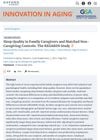89 citations,
March 2001 in “Endocrine practice” The guidelines help doctors diagnose and treat hormone-related disorders in women.
 41 citations,
March 1992 in “Archives of Dermatology”
41 citations,
March 1992 in “Archives of Dermatology” The review suggests that understanding and treating the psychological aspect of skin disorders is important and calls for more collaboration in this field.
19 citations,
January 1990 in “Springer eBooks”  9 citations,
September 2000 in “Obstetrics and gynecology clinics of North America”
9 citations,
September 2000 in “Obstetrics and gynecology clinics of North America” Hirsutism causes significant psychological distress in women.
 5 citations,
January 2017 in “Clinics in Dermatology”
5 citations,
January 2017 in “Clinics in Dermatology” Skin symptoms without a medical cause often reflect psychological stress and are influenced by culture, requiring a team approach for treatment.
5 citations,
January 2017 in “Dermato-endocrinology” Postmenopausal women with past hirsutism or irregular periods have more heart and lung diseases.
 4 citations,
December 2021 in “Experimental and Therapeutic Medicine”
4 citations,
December 2021 in “Experimental and Therapeutic Medicine” Adult female acne is complex and requires a combination of treatments for effective management.
 2 citations,
August 2022 in “Reproductive Biology and Endocrinology”
2 citations,
August 2022 in “Reproductive Biology and Endocrinology” Magnesium supplements improved quality of life for women with polycystic ovary syndrome, but didn't help with acne, hair loss, or abnormal bleeding.
 1 citations,
January 2023 in “Journal of Clinical Medicine”
1 citations,
January 2023 in “Journal of Clinical Medicine” A new hair restoration technology was found to effectively increase hair thickness, density, and growth, while reducing hair loss and improving scalp health, with no side effects.
1 citations,
September 2021 in “Nigerian journal of medicine : journal of the National Association of Resident Doctors of Nigeria” Androgenetic alopecia is common in South-West Nigeria, affecting more men than women, with stress worsening the condition.
 1 citations,
January 2002 in “Dermatology + psychosomatics”
1 citations,
January 2002 in “Dermatology + psychosomatics” Most people worried about abnormal hair loss actually have psychological issues like depression or anxiety.
 1 citations,
June 2001 in “Annals of Internal Medicine”
1 citations,
June 2001 in “Annals of Internal Medicine” The conclusion is that maintaining blinding in clinical trials is crucial for reliable results.
 February 2024 in “BMJ Open”
February 2024 in “BMJ Open” The study concluded that different treatments reduced post-COVID symptoms over time and that factors like age, severity, and comorbidities affect symptom risk.
 February 2024 in “Skin Research and Technology”
February 2024 in “Skin Research and Technology” Microneedle therapy combined with serum effectively increases hair count in people with hair loss, with no side effects.
 January 2024 in “Journal of Cosmetic Dermatology”
January 2024 in “Journal of Cosmetic Dermatology” Microneedling combined with other treatments significantly improves hair growth in people with hair loss and is safe.
 April 2023 in “JOJ dermatology & cosmetics”
April 2023 in “JOJ dermatology & cosmetics” The conclusion is that a team of skin doctors and psychiatrists is needed to better treat patients with mind-skin disorders.
 January 2023 in “Endocrine Journal”
January 2023 in “Endocrine Journal” Treating classic 21-hydroxylase deficiency requires precise glucocorticoid dosing and attention to individual patient needs, with new treatments showing promise.
 December 2022 in “Cureus”
December 2022 in “Cureus” Adult women with acne in Iraq often have more severe symptoms and hormone-related issues than younger girls with acne.
 December 2021 in “Innovation in Aging”
December 2021 in “Innovation in Aging” Family caregivers take longer to fall asleep and have more sleep disturbances, which may contribute to their health problems.
 November 2021 in “Research, Society and Development”
November 2021 in “Research, Society and Development” Individualized treatment and psychological support are crucial for alopecia.
 January 2018 in “Deleted Journal”
January 2018 in “Deleted Journal” Managing PCOS effectively requires focusing on psychological health, lifestyle changes, and medication.
 71 citations,
November 2013 in “Clinics in Dermatology”
71 citations,
November 2013 in “Clinics in Dermatology” Acne is a chronic disease linked to various systemic conditions and has significant psychological and social effects.
 19 citations,
January 2007 in “Dermatology”
19 citations,
January 2007 in “Dermatology” Unwanted facial hair significantly impacts over 40% of women's psychological and social well-being, and various treatment options are available.
 1 citations,
April 2024 in “Skin research and technology”
1 citations,
April 2024 in “Skin research and technology” Topical rosuvastatin and melatonin creams significantly reduce psoriasis severity and are safe.
 1 citations,
July 2023 in “Cureus”
1 citations,
July 2023 in “Cureus” Some treatments for hereditary hair loss are effective but vary in results and side effects; new therapies show promise but need more research.
 November 2024 in “Applied Sciences”
November 2024 in “Applied Sciences” Placenta products might help with hair loss, but more research is needed.
 March 2024 in “BMC women's health”
March 2024 in “BMC women's health” The levonorgestrel implant increases free testosterone and lowers SHBG more than DMPA-IM and the copper IUD.
 September 2023 in “International Journal of Trichology”
September 2023 in “International Journal of Trichology” Oral Vitamin D can improve hair density and reduce hair loss in Telogen Effluvium patients.
 August 2023 in “Stem Cell Research & Therapy”
August 2023 in “Stem Cell Research & Therapy” Using adipose-derived stem cell media with minoxidil may help regrow hair in men with hair loss.
 July 2023 in “Journal of the European Academy of Dermatology and Venereology”
July 2023 in “Journal of the European Academy of Dermatology and Venereology” Hair loss can indicate various health issues, including serious diseases, hormonal imbalances, and can significantly affect personal life and mental health.

























